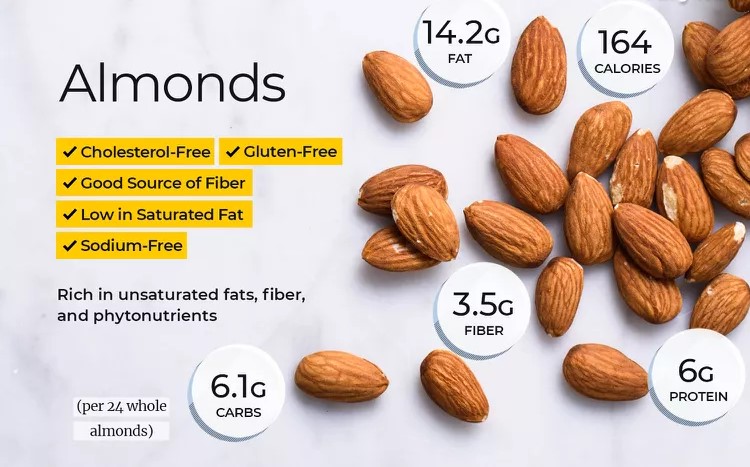
Nutritional Profile of Almonds
Almonds stand out because they pack a lot of nutrients into a relatively small serving. Here’s a breakdown of what a typical serving (about 30 g, or ~23 almonds) offers:
| Nutrient | Amount per ~30g (1 oz) | Key Roles & Notes |
|---|---|---|
| Calories | ~160–180 kcal | A concentrated energy source |
| Protein | ~6 g | Plant protein to support muscles and repair |
| Dietary Fiber | ~4 g | Aids digestion, supports gut health |
| Total fat | ~14 g (mostly unsaturated) | Heart‑friendly fats (monounsaturated & polyunsaturated) |
| Saturated fat | ~1 g | Low in saturated fat |
| Vitamin E | ~7–8 mg (≈ 50 % of DV) | Powerful antioxidant protecting cells |
| Magnesium | ~70–80 mg | Important for nerve, blood sugar, muscle health |
| Calcium | ~75–80 mg | Supports bone strength |
| Phosphorus, potassium, zinc, copper, iron, B vitamins (riboflavin, niacin, folate) | various amounts | Contribute to metabolism, immunity, bone health, more |
Almonds are naturally low in sugar, cholesterol‑free, and sodium‑free unless salted.
Because of this nutrient density, just a handful of almonds provides a rich source of healthy fats, protein, fiber, vitamins, minerals, and antioxidants.

Top Health Benefits of Almonds
Almonds deliver a wide spectrum of benefits, backed by scientific research. Below are some of the most important:
1. Heart Health & Cholesterol Control
-
Almonds help lower LDL (bad) cholesterol and maintain or increase HDL (good) cholesterol.
-
They also protect LDL from oxidation (a key step in plaque formation) thanks to antioxidants in the almond skin.
-
The unsaturated fats (especially monounsaturated oleic acid) in almonds support arterial health and blood vessel function.
2. Antioxidants & Inflammation Control
-
Almonds are rich in antioxidants, especially vitamin E, phenolic compounds, and flavonoids.
-
These antioxidants help reduce oxidative stress, which is linked to aging, chronic diseases, and inflammation.
-
Some clinical trials show that consuming almonds (in moderate amounts) reduces inflammatory markers in the body.
3. Blood Sugar Regulation & Diabetes Support
-
Almonds are low in net carbohydrates but high in healthy fats, fiber, and magnesium — a combination that slows down the absorption of sugar and helps regulate blood glucose levels.
-
The magnesium in almonds plays a role in insulin sensitivity and is often found low in individuals with type 2 diabetes.
4. Weight Management & Satiety
-
Even though almonds are calorie‑dense, their fiber, protein, and fat content help promote fullness, reducing overeating.
-
Some studies show that people who eat almonds tend to reduce overall calorie intake because they feel satiated.
-
Because a portion of the calories in nuts is less bioavailable (i.e. not fully absorbed), the effective calorie gain from nuts can be lower than expected.
5. Brain & Cognitive Health
-
Almonds provide vitamin E, riboflavin (vitamin B2), and L‑carnitine, nutrients linked to cognitive function, memory, and reduced risk of neurodegenerative diseases.
-
Antioxidant protection helps protect neurons from oxidative damage over time.
6. Bone & Dental Health
-
With calcium, phosphorus, magnesium, and protein, almonds contribute to strong bones and teeth.
-
Regular intake can help reduce risk of osteoporosis, especially when part of a balanced diet.
7. Skin, Hair & Beauty
-
Vitamin E is known for promoting skin health, protecting against UV damage, and supporting skin repair.
-
Almond oil (extracted from the nut) is commonly used topically for hair, scalp, and skin care in cosmetics and traditional remedies.
8. Digestive Health & Gut Microbiome
-
The fiber in almonds helps maintain regular bowel movements, supports gut health, and can act as a prebiotic (food for good gut bacteria).
-
Some research suggests almond consumption increases beneficial short-chain fatty acids like butyrate, which support colon health.
How to Include Almonds in Your Diet
Here are some practical and tasty ways to enjoy almonds:
-
Raw or Roasted as a Snack
Eat a small handful (around 20–30 nuts). Roasting lightly (without too much oil or salt) intensifies flavor. -
Soaked Almonds / Sprouted Almonds
Soaking overnight (in water) helps soften the nuts and may increase digestibility and nutrient absorption. Some people prefer to peel the skin after soaking. -
Almond Milk
A dairy-free alternative — blend soaked almonds with water, strain, and use the milk in cereals, smoothies, coffee, etc. -
Almond Butter or Spread
Use as a spread on toast, or blend into smoothies or sauces. -
Almond Flour / Meal
Use in baking (gluten‑free breads, cakes, cookies) or as a coating for meats and vegetables. -
In Recipes
Add sliced or chopped almonds to:-
Salads
-
Oatmeal / porridge
-
Yogurt bowls
-
Granola / muesli
-
Curries, rice dishes, pilafs
-
Desserts and smoothies
-
-
Almond Oil / Extracts
Use in cooking (lightly), or for skin/hair care (topical use).
How Much Almonds to Eat? (Serving & Moderation)
-
A common recommended serving is 20–30 grams (about 1 ounce or ~23 almonds) per day. This gives significant nutrients without excessive calories.
-
Some studies use up to 40–60 grams per day (≈1.5–2 oz) with benefits, but those are in controlled research settings.
-
Always consider the rest of your daily calorie budget. Overconsumption might lead to weight gain if not balanced.
Possible Risks & Precautions
While almonds are generally safe and healthy, keep in mind:
-
Nut Allergies: Almonds are tree nuts; allergic individuals must avoid them.
-
Overeating / Weight Gain: Due to high calorie density, too many almonds can lead to excess calories.
-
Phytic Acid & Mineral Absorption: Almonds contain phytic acid, which can bind minerals (iron, zinc, calcium) and reduce their absorption. Soaking, sprouting, or combining with vitamin C foods can help.
-
Vitamin E Overdose (rare): Very high intake over a long period may cause side effects; usually not a concern from nuts alone.
-
Bitter Almonds: Bitter almonds contain amygdalin and can produce cyanide; they must not be consumed raw.
-
Kidney Stones / Oxalates: In rare cases, high intake of certain nut compounds may contribute to kidney stones in susceptible individuals.
-
Choking Hazard for Young Children: Whole nuts can be choking hazards for toddlers.
Conclusion
Almonds are a remarkable health food: nutrient‑dense, rich in healthy fats, antioxidants, vitamins, minerals, and more. They support heart health, blood sugar balance, digestion, brain function, skin, and even weight management — when eaten in moderation. Incorporating a handful of almonds into your daily diet can be one of the simplest yet powerful ways to boost your overall wellness.

You must be logged in to post a comment.